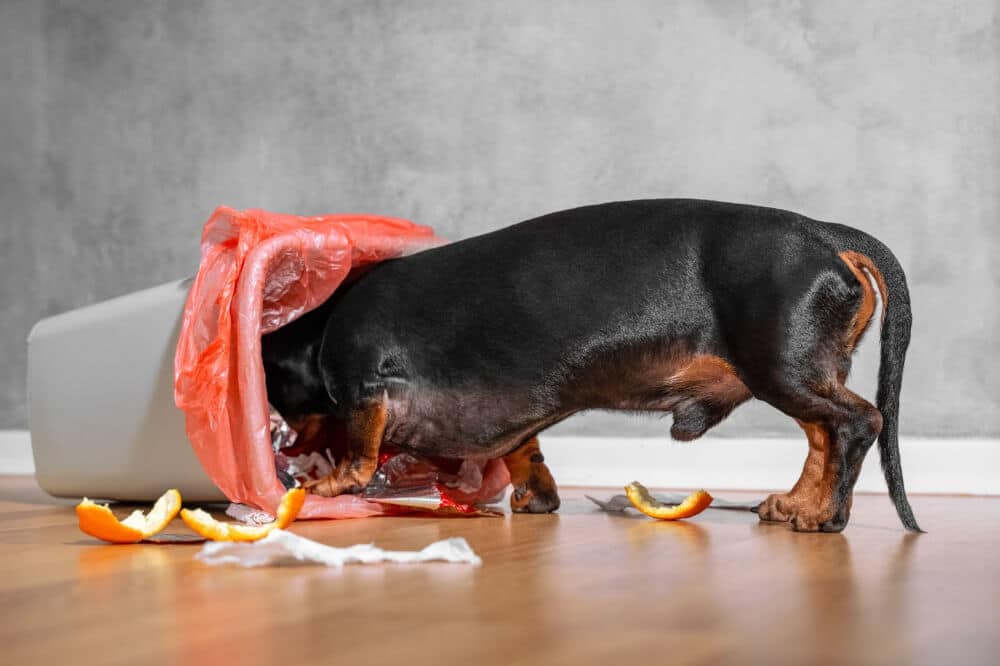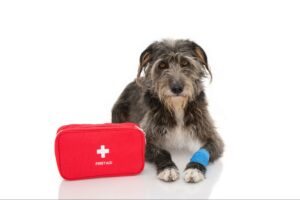Prevention Tips for Both Types of Pests
Chocolate cake. Tulips. Wine.
These are just a few of the seemingly harmless household items that can be harmful if ingested by your dog. As a Pack Leader, it’s essential to be aware of the many common substances that can be poisonous to your dog and the steps you can take to prevent and treat dog poisoning.
If You Know or Suspect Your Dog is Poisoned
First, remain calm. Though it’s important to act quickly, you must also act carefully — your actions may determine the outcome of your dog’s health emergency.
Step 1
Collect remaining poison or any other substances involved, such as vomit. This evidence can help your vet and other emergency responders identify the type of poison that has affected your dog.
Step 2
Call your vet or the ASPCA Animal Poison Control Center (APCC). You can reach the APCC at (888) 426-4435 and receive advice from animal poison experts for a $65 consultation fee.
Step 3
While speaking on the phone with your vet or animal control experts, you should be ready to tell them the breed, age, sex, and weight of your dog, as well as symptoms and other important information about the incident. If possible, find the product or container for the poisonous substance and keep it on hand for reference throughout the call. The professionals will advise you on your next course of action.
However, if your dog has a seizure, is struggling to breathe, or loses consciousness, bring her to your local vet or emergency clinic immediately.
Common Causes of Dog Poisoning
Safe for humans doesn’t necessarily mean safe for dogs. Many foodstuffs, medications, and products in your house can be highly toxic to your dog.
Below, we’ve listed some of the most common culprits.
Human Food
Your dog’s metabolism is very different from your own, which is why some of your favorite snacks can be hazardous and, in some cases, fatal to your dog. Common dog poisons in the kitchen include chocolate, avocados, grapes and raisins, macadamia nuts, and alcohol. Xylitol, an artificial sweetener in sugar-free gum, can cause unwanted health problems, including weakness and seizures. While some human foods can be safely shared with your dog, it’s generally a good idea to play it safe and only give treats specially made for dogs.
Human Medications
Many medications that are helpful to humans can be harmful to dogs. Some of the most common examples include antidepressants, blood pressure, and pain medications. Over-the-counter medications, such as Tylenol, ibuprofen, Advil, Aleve, and human fish oil supplements, can also be toxic. To prevent accidents, you should stow all your medications in cabinets inaccessible to your dog.
Household Products
Numerous standard household products contain chemicals that your dog should never ingest. Cleaners, antifreeze, pool cleaning chemicals, and lawn and garden products can all lead to serious health complications for dogs that consume them. Antifreeze is particularly problematic because it’s deadly but tastes sweet, making it an attractive hazard to your dog if not properly stored away.
Insecticides and Rodenticides
Products designed to fight ants, roaches, and other insect pests can be poisonous to dogs. Consuming rodenticide – or a rodent that has been poisoned – can also lead to severe problems. Be sure such products are inaccessible to your dog, and follow guidelines for use closely.

Signs of Dog Poisoning
Different poisonous substances may affect your dog differently depending on how much they ingested. While symptoms of dog poisoning can vary vastly from case to case, here are some of the most common:
Abnormal Behavior
If your dog is lethargic or seems unsteady when standing or walking, this may be a sign of poisoning. Additionally, dogs that have been poisoned may exhibit hyperactivity.
Black, Tarry Stool
Bright red, black, or tarry stool can be a symptom of dog poisoning. If your dog has eaten something that has made them sick, it is important to take them to the vet immediately.
Collapse
Another symptom of dog poisoning is collapsing, and this can happen very suddenly and may be accompanied by seizures or tremors. If your dog starts collapsing, it’s essential to get them to a veterinarian as soon as possible, as this often indicates a serious medical condition.
Coughing
One of the first symptoms of dog poisoning is usually coughing, and this is because many poisons, including pesticides and herbicides, contain chemicals that irritate the respiratory system. If your dog starts coughing after exposure to a potentially toxic substance, it’s important to seek veterinary care immediately.
Decreased or Absent Urination
Decreased or absent urination is one of the first indicators that your dog may have been poisoned. If you notice that your dog is urinating less frequently than usual or not, it’s essential to seek medical care, which can lead to dehydration and other health problems.
Diarrhea
If you notice that your dog has loose stools, it’s important to seek medical attention as soon as possible. In some cases, diarrhea can lead to dehydration, which can be life-threatening. If you have any concerns that your dog may have been poisoned, don’t hesitate to contact a professional for help.
Discolored Gums
Discolored gums are often a sign that something is wrong. If your dog’s gums are pale or blue, this is a sign that they are not getting enough oxygen, and you should seek medical help immediately.
Excessive Thirst
One of the first things to look out for if you think your dog has been poisoned is excessive thirst. If your dog suddenly drinks a lot more water than usual, it could be a sign that something is wrong.
Excessive Urination
You will likely notice some obvious symptoms if your dog has been poisoned. Chief among these is excessive urination. This is a result of the poison causing damage to the kidneys, which cannot filter the blood properly.
Lack of Appetite
Dogs are especially prone to poisoning since they are curious by nature and often put things in their mouths without thinking. Many common household items can be poisonous to dogs, including chocolate, antifreeze, and rat poison. If your furry friend has a decreased appetite, consider contacting your vet.
Nausea
Nausea may cause your dog to vomit or have diarrhea, and in severe cases, it can lead to dehydration and even death. If you think your dog has been poisoned, it is crucial to seek veterinary care immediately.
Vomiting
Another common symptom of dog poisoning is vomiting. If your dog starts vomiting, it’s essential to pay attention to other signs and symptoms. For example, if your dog is also lethargic and has a loss of appetite, this could be a sign that they are suffering from poisoning.
Weakness
Nausea may cause your dog to vomit or have diarrhea, and in severe cases, it can lead to dehydration and even death. If you think your dog has been poisoned, it is crucial to seek veterinary care immediately.
How were you able to tell your dog was poisoned?











